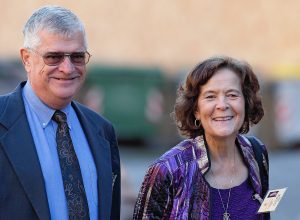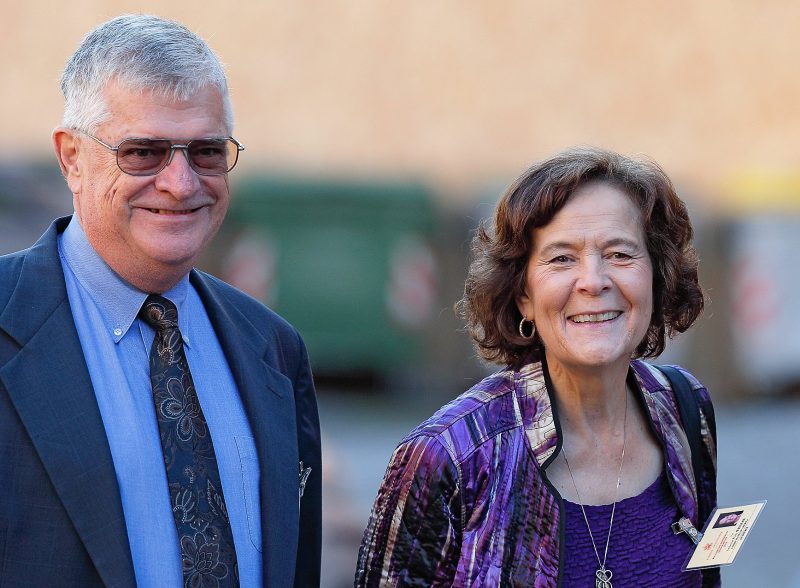by MICHAEL OTTO
Priestly formation should be geared to living a closer relationship with families in parishes, and couples should not be separated when performing parish ministries.

Tony and Cathy Witczak arrive for a session of the Synod of Bishops on the family at the Vatican on October 12, 2015. (CNS photo)
Those were some of the messages delivered to last year’s synod on the family in Rome by Tony and Cathy Witczak, from the United States.
On February 28, at St Mark’s parish in Pakuranga, the couple gave a presentation on their experience at the synod, where they were auditors.
They know St Mark’s parish priest, Fr Emile Frische, MHM, well, having been alongside him on Worldwide Marriage Encounter’s internal leadership team.
At St Mark’s, the Witzacks read out their three-minute “intervention” given at the synod, in which they outlined how a marriage encounter weekend in 1979 had led them to see their married vocation in a new light.
“Together, we discovered that God wanted us to be intimately united so we could be radiant signs of his love in the world,” Mr Witczak said.
The model of couples working side by side with a priest is one they believe in.
“This intimate community helped us to see how we are meant to support one another, in our common mission of building the family of God,” Mrs Witczak said. “The priest challenges the couple to grow spiritually; the couple offers the priest the opportunity to grow emotionally as part of a family.
“Together, in community, they offer a wonderful model for Church that encourages openness to vocations.”
Three suggestions
Mr Witczak read out three suggestions the couple made to the Pope and the synod fathers. The couple stressed the need for better programmes for engaged and married couples in the Church.
They also said couples should not be separated when taking part in parish ministry, “but rather let the sacrament shine by allowing them to work as a team”.
Their third recommendation concerned priestly formation being geared to living a closer relationship with families in their parishes.
“If the Church is meant to be a family of families, then we should encourage our seminarians to be priests in love with their people, not merely priests in charge of a parish,” Mr Witczak said. “Our faith is based on relationship with God, but it is learned and lived out in relationship with others.”
The Witczaks told the St Mark’s gathering that when they arrived at the synod, “we felt rather in over our heads”. “It seemed to us that everybody knew all these titles of documents and all the things going on in the Church, and we felt a little bit inadequate to say the least,” Mrs Witczak said.
“We had to keep reminding ourselves … that we weren’t being asked to be experts on theology, we were asked [to the synod] because we were experts on marriage and living the sacrament.”
The couple, who have been married for 49 years, have four children and 16 grandchildren.
At the synod they attended the general assemblies and also took part in small group work, being members of an English-speaking group that included Dr John Kleinsman from New Zealand, Cardinal Vincent Nicholls of Westminster, and Archbishop Diarmuid Martin of Dublin.
“At one point, we shared around the group what family meant to us … and it was amazing the stories that came out, and we began to feel more like a family, that we all had something in common, the experience of being a family, the experience of being Church,” Mrs Witczak said.
The Witczaks were grateful that the synod was an exercise in listening and journeying together.
“Every couple [there] was able to bring their concerns, their struggles, the joys about families, what is happening in their part of the world to the Pope himself and to the synod fathers,” Mr Witczak said.
The fact that there was a strong emphasis on listening is evident in the pastoral flavour of the synod’s final document delivered to Pope Francis, they said.
“The synod fathers were sincerely trying to listen to every voice,” Mrs Witczak said. “But the problem was that some of the press was asking for and expecting doctrinal change, and that was not something any of the synod fathers had in mind,” she said.
“It is about procedural changes, pastoral changes, how can we better respond? We are not going to change our beliefs, the teachings of the Church.”
The couple cited references to samesex “marriage” in the final document as an example.
“I think the way they put it was that gay ‘marriage’ is in no way shape or form equal to the sacrament of marriage, but there was strong support, from everybody there, recognising that gay men and women are part of our family and we love them and we welcome them and we try to show them the correct path,” Mrs Witczak said.
On the final day of the synod, the Witczaks asked Pope Francis for a word of encouragement for Worldwide Marriage Encounter.
The Pope responded: “You must continue lighting the way for others.” Mrs Witczak said the couple realised that this not just advice for marriage encounter, but for everyone, to continue being good families and good couples and “to continue lighting the way . . .”.
The head of the Pontifical Council for the Family, Archbishop Vincenzo Paglia, said in January that the Pope’s post-synodal apostolic exhortation would probably be published in March.
Archbishop Paglia predicted that the papal document will “show that the Church is close to families in all stages of their lives”.

Reader Interactions